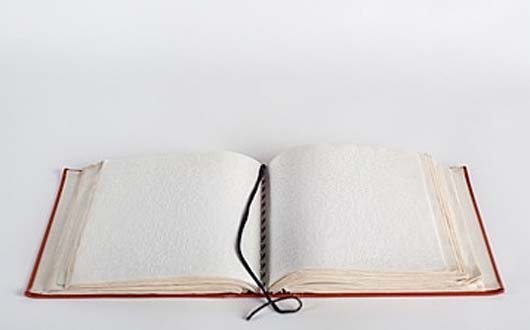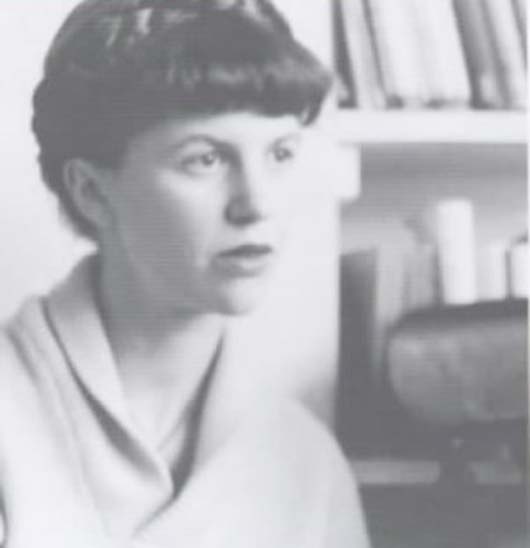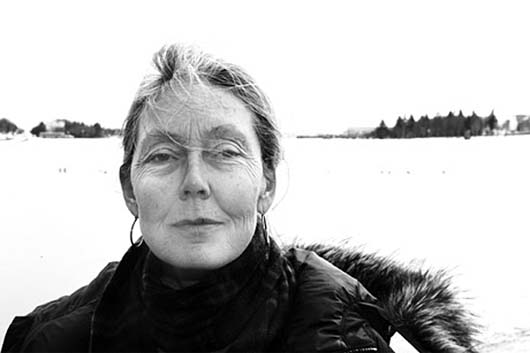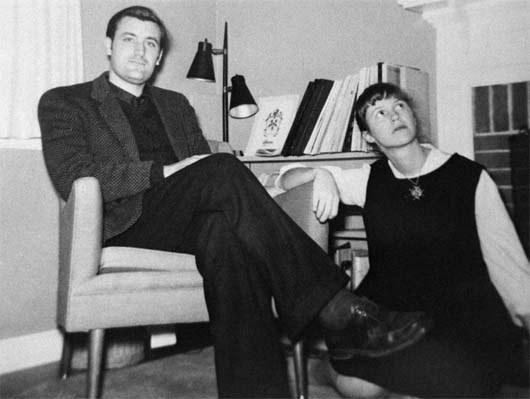 POETRY
POETRY In Which Nobody Sees Us Glowing
 Monday, February 11, 2013 at 10:35AM
Monday, February 11, 2013 at 10:35AM 
Living Alone
by ALICE BOLIN
1
“Your absence has gone through me/Like thread through a needle,” reads W.S. Merwin’s classic, tiny poem “Separation.” “Everything I do is stitched with its color.”
Some poems go through me like thread through a needle, including that one. I carry them with me, my mind snags on their lines, so that the words color the patterns of my thoughts. They form and they reflect my relationship with myself, my fantasy of myself.
2
“I am too pure for you or anyone,” I sometimes find my mind iterating on a loop. This is from Sylvia Plath’s “Fever 103˚,” a famous poem, and a characteristically Plath-ian one. It combines many of Plath’s preoccupations — heat, sickness and hospitals, purity, flowers, religion, war and atrocity — with her penchant for a keen and forceful melodrama.
The poem cycles through a violent rush of images, presumably mimicking the assault of visions in a fever dream. But the lines I love best reflect a vision that Plath has of herself. “I am too pure for you or anyone,” she writes.
Your body
Hurts me as the world hurts God. I am a lantern
My head a moon
of Japanese paper, my gold beaten skin
Infinitely delicate and expensive.
Does not my heat astound you. And my light.
All by myself I am a huge camellia
Glowing and coming and going, flush on flush.

3
In Plath’s work we see a fixation on personal purity. Esther, the protagonist of her novel The Bell Jar, takes painfully hot baths essentially to re-baptize herself. But Plath’s purity is a hard thing: it is not about innocence, or religious goodness, or sexual abstinence. It is more about wholeness, being a complete and original self, unadulterated by any other personality.
The purity in “Fever 103˚” is coupled with a ravishing delicacy, the image of a body like a flower or a paper lantern. These all work to establish the speaker of “Fever 103˚” as separate from other people — both blessedly and painfully so. To think of oneself as set apart by purity, by beauty, and by delicacy is also to think of oneself as constantly being sullied, tarnished and damaged by other people.
4
When I was in eighth grade we read Plath’s poem “Mushrooms” out loud over and over. I can hear my English teacher, Mrs. Hodgin, saying in her Louisiana accent, “Nobody sees us,/Stops us, betrays us;/The small grains make room,” pounding her fist on the accented syllables. “So many of us!/So many of us!” we shouted, and at that point in the poem I sometimes felt slightly nauseous. It was not until I reread the poem as an adult that I realized that it was actually and concretely about mushrooms.
The ritual repetition of this poem whose only meaning for me was the synesthetic evocation of an olive-brown color along with a slow, uneasy feeling has caused its lines to stick with me, as mysterious and grave as enchantments. “Our toes, our noses/Take hold on the loam” are the lines that will come creeping terribly through my mind, settling in, permeating everything.
We talked a lot about Plath’s suicide then. Plath maybe had not really meant to kill herself, Mrs. Hodgin told us. She frequently put her head in the oven on days when she knew her mother was visiting, as a cry for help.
Who knows if that story’s true. I’ve never bothered to confirm it.
5
This was around the same time that I felt my own separation from other people revealed to me. The summer after eighth grade, I was convinced I was going to die before my thirteenth birthday in August. I stopped sleeping. I turned on my overhead light one day and then it wouldn’t turn off. After a week, I cut its wires with kitchen shears. Even after I didn’t die, something monstrous followed me, I felt my heart and my brain rush, I was tense all the time. I sometimes have a perverse sense looking back that this suffering was the raw truth of my identity. “Today, recognizing it as the sadness I’ve always had,” Marguerite Duras writes in her novel The Lover, the story of a teenage girl discovering herself stricken by separateness, “I could almost call it by my own name, it’s so like me.” Eventually I was put on antidepressants and I read The Bell Jar, of course. I knew the feeling of being set apart by sadness, Sylvia and I, alone together.

6
I talk to myself often in lines from Anne Carson’s “On Defloration,” from her prose poem series “Short Talks.” “The actions of life are not so many,” Carson writes.
To go in, to go in secret, to cross the Bridge of Sighs. And when you dishonored me, I saw that dishonor is an action. It happened in Venice; it causes the vocal cords to swell. I went booming through Venice, under and over the bridges, but you were gone. Later that day I telephoned your brother. What’s wrong with your voice? he said.
I think of the scene of Esther losing her virginity in The Bell Jar, and the traumatic, torrential bleeding that follows. It makes sense that someone with such fiercely guarded purity would take this invasion of her body harder than most.
7
To be dishonored is not an action. It is a state of being, a state of insult continually renewed as a camellia’s delicate petals are bruised and bruised.
“If he’s attracted to you,” my friend Matt said this winter, in a booth near the door of a freezing dive bar, “it’s probably because you have a way of identifying things about people. You can sort of say… what the situation is.” Any man who would be attracted to me, if I understand what Matt was saying, is the kind of man who enjoys the negative attention of being told what his problem is.
8
Many of the poems I have stuck in my head are badly misremembered. “One day I will say to you how all mixed up I am because of you” is my brain’s mangled version of a line from John Ashbery’s “Worsening Situation”: “One day I’ll claim to you/How all used up I am because of you.” But the song remains the same — the tone is injured, self-pitying, accusatory, the complaint of the dishonored.
Richard Hugo’s poem “Living Alone” tells the story of an eccentric and possibly sinister “animal man” who lives a solitary life in a cabin in the woods. My deep association with this poem is sort of inexplicable; although when the animal man describes how he has named the deer near his cabin, there is the wonderful line, “Alice, I liked best.” It is the poem’s simple title that reverberates for me. “The city burning is Los Angeles’s deepest image of itself,” Joan Didion writes. My deepest image of myself is of a person living alone.
9
In my romantic disappointments it is always the problem of being drawn to people who are “unavailable,” meaning in a relationship, newly out of a relationship, or living in a different state. The coarsest armchair psychology can explain that when a person is attracted to unavailable people, it is because they themselves are unavailable — because they fear intimacy, because they feel must avoid threats to their individuality, because the self is a secret they do not want to disclose, or because they have fetishized their loneliness.
In Woody Allen’s film Manhattan, Mary, played by Diane Keaton, has just been dumped by her married boyfriend, so she goes to visit Allen’s character, Isaac. “You pick a married guy, and when it doesn’t work out, it confirms your worst feelings,” Isaac tells her. “What worst feelings?” Mary asks. “You know,” Isaac says, “your feelings about men and marriage and that nothing works.”
If you are convinced that nothing works out, you can choose a romantic situation that’s already broken. You can confirm your existential separateness by choosing situations where alienation is assured. You can seek to be dishonored because it reinforces your purity.

10
“Only connect…” reads the epigraph to E.M. Forster’s masterpiece Howards End, his sprawling examination of turn-of-the century London and the effects of industrialization on the national soul. This is the motto of the novel’s innocent and strident and soulful heroine, Margaret Schlegel. She insists that it is a mistake to favor either the abstract or the concrete, the romantic or the practical, the rural or the urban, tradition or progress — it is the marriage of opposites that gives life its meaning and provides true insight. “Only connect! That was the whole of her sermon,” Forster writes. “Only connect the prose and the passion, and both will be exalted, and human love will be seen at its height. Live in fragments no more.”
It is a rejection of purity — no one is set apart, and no one’s identity is completely their own. She seeks to connect life’s diverse aspects and to connect with other people. Margaret’s mission is always to be more trusting and less suspicious, even if it means she gets hurt, even if it means she is dishonored.
And I saw that trust is an action.
11
In Carson’s short talk “On Sylvia Plath,” she writes, “She said plain, burned things. She said I thought it an excellent poem but it hurt me.” This is a helpful frame for Plath, because it is an image not of a woman but of work — work that is marked by its terrible purity.
12
I am devoted to Plath, but I still cannot cultivate much interest in her biography, meaning mostly her marriage and death. This is because the portrait that her biography paints — of a fragile, overly emotional, unstable desperate housewife — does not line up with the portrait that I have developed of her through her work. I see Plath as a skillful and deliberate craftsperson, dominant over her words and her subjects. The extreme sentiments displayed in her work were a calculated performance. Lines as exquisite as “All by myself I am a huge camellia/Glowing and coming and going, flush on flush” simply could not have been written by a person who was completely out of control.
That Plath wrote fiercely about difficult emotions should not be ignored, but an idea of her as a figure of tragic separateness is really beside the point. I have learned to let go of thinking of her as pure and damaged and set apart, and I’m trying to stop thinking of myself that way. Now I love Plath not for her sadness, but for her strength.
13
It is complicated — there is the persona of Plath herself, the mature and technically gifted writer, and the persona Plath creates in her work, who I still sometimes cling to as a totem of resentment and bad-girl energy. Her diaries are so bitchy and self-pitying and dramatic that they are often very funny. The line from her diaries that I say to myself most is “I don’t care about anyone, and the feeling is quite obviously mutual.”
There is freedom in self-parody: the freedom to see that an extreme and romanticized vision of yourself does not account for all the complexities of who you are or could be. At one point I wrote in my eighth grade diary, “I am exceedingly sensitive, but I never let it show when someone hurts my feelings.” This is hilarious because it could not have been less true. It is complicated — the interaction of who you are and the lies you tell yourself about who you are.
14
If, like Matt said, I have a way of identifying what’s going on in other people’s heads, then that insight could lead me to be more open, to connect more, rather than making me more wary, more unavailable. I am a person who, when giving advice, has been known to repeat Bruce Springsteen lyrics like they are ancient and profound koans: “Don’t make no difference what nobody says,/Ain’t nobody like to be alone.”
The importance of Margaret’s ethos in Howards End is that in connecting, she is not flattening or simplifying the shades of human experience — she is more aware of the varying and contradictory elements that make up our lives and ourselves. “It is part of the battle against sameness,” she says. “Differences — eternal differences, planted by God in a single family, so that there may always be colour; sorrow perhaps, but colour in the daily grey.”
Alice Bolin is the senior contributor to This Recording. She is a writer living in Missoula.. She last wrote in these pages about Taylor Swift. She tumbls here and twitters here. You can find an archive of her writing on This Recording here.

"What's Your Name?" - Carillo (mp3)









































